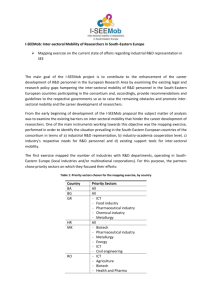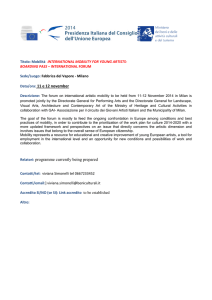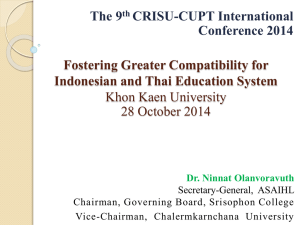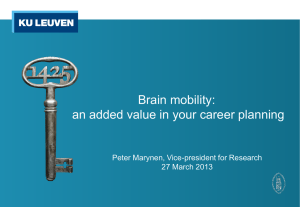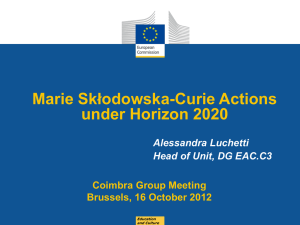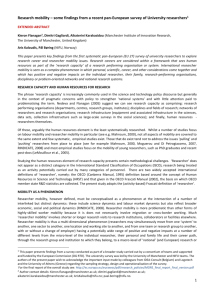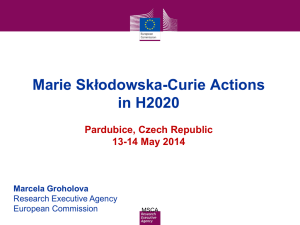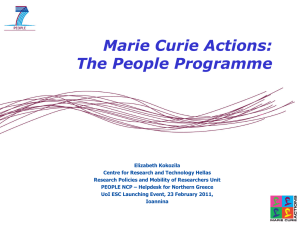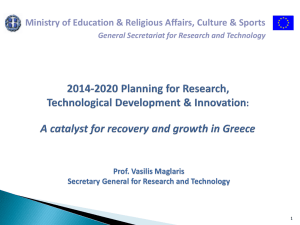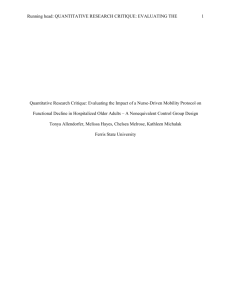National Strategic Research and Innovation Framework 2010-1015
advertisement
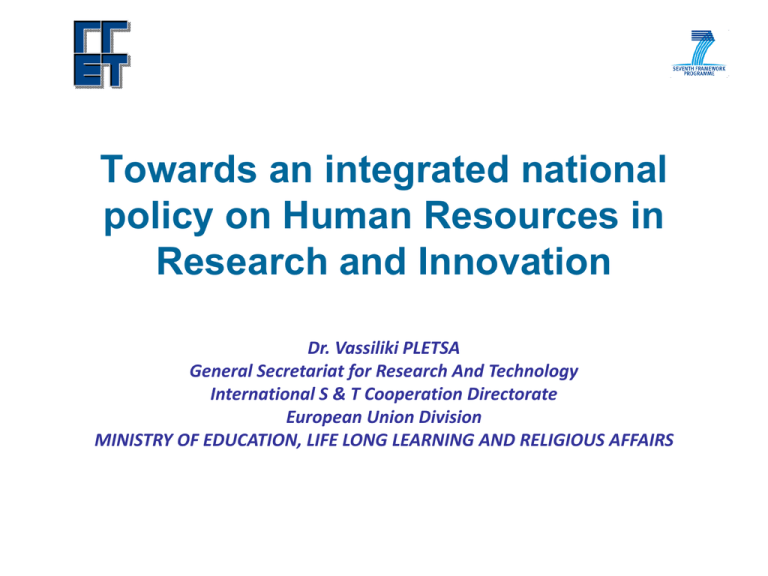
Towards an integrated national policy on Human Resources in Research and Innovation Dr. Vassiliki PLETSA General Secretariat for Research And Technology International S & T Cooperation Directorate European Union Division MINISTRY OF EDUCATION, LIFE LONG LEARNING AND RELIGIOUS AFFAIRS National Strategic Research and Innovation Framework 2010-1015 Education, Research, Innovation National Research Area to combat fragmentation and further enhance links between universities and research centres, establish sustainable cross-talk between academia and the productive sector (adressing mainly SMEs to enhance Innovation) Human Resources and Excellence and Collaboration in the heart of the reform 2 The public research sector Main Obstacles Legal reforms are implemented slowly Lack of entrepreneurial spirit in the Greek research community. Bureaucratic and time-consuming management system Incompatibility between the supply and demand of employment in the research – technology - innovation sector Public effort in the area of R&D is spread in many sectors, organizations and groups not attaining the critical mass that would have brought results. Main Instruments • Long term research programmes (reflecting national priorities, combatible with the ERA and major societal challenges) • Increase GERD/GDP to 2% by 2020 as the Gross Domestic Expenditure on Research and Technological Development (GERD) as a percentage of Gross Domestic Product (GDP) remains low 3 (0,6%), The Private Sector Incentives for private investment in research and structures promoting innovation • Law 3296/2004 economic incentives to enterprises, deduction of RTD expenditure from profits of private firms • Investment Incentives Law 3299/2004 • 5 Regional Innovation Poles, Innovation zone in Thessaloniki, Hellenic Technology Cluster Initiatives in the Micro-electronics sector, Spin-off companies The business sector remains the weakest part of the Greek RTD system (BERD/GERD ~ 0.20%) 4 The Human Resources Issue in the context of the National Strategic Research and Innovation Framework 2010-1015 Main Goals Encourage a career in research Encourage researchers’ mobility Avoid brain drain, attract excellent researchers from abroad Main Instruments in the context of the National Strategic Research and Innovation Framework 2010-1015 Doctoral and Post-doctoral fellowship programmes Incoming researchers grants Inter- and Intra-sectoral Mobility programmes 5 The Human Resources Issue Two Research Centres NHRF and CERTH in close collaboration with the GSRT have promoted the Researchers Mobility Issues in Greece: The National Hellenic Research Foundation, CERTH, the University of Crete and the University of Ioannina have undersigned the principles of the Charter&Code Considerable increase in the number of job vacancies published in the EURAXESS Jobs portal Transposition of EU Directive 2005/71 for admitting third country nationals for the purposes of scientific research 6 THE I-SEEMob EUROPEAN PROJECT (Coordinator:GSRT, Mr. G. Adamopoulos, g.adamopoulos@gsrt.gr, 2107458113) Enhancing inter-sectoral mobility of researchers in South-Eastern Europe The I-SEEMob project aims at contributing to the enhancement of the career development of R&D personnel in ERA by examining the existing legal and research policy gaps hampering the inter-sectoral mobility of R&D personnel in the South-Eastern European Countries participating in the consortium and, accordingly, provide recommendations and guidelines to the respective governments so as to raise the remaining obstacles and promote intersectoral mobility and the career development of researchers Development of a set of policy recommendations to the national governments for improving and supporting the inter-sectoral mobility of R&D personnel and, thus, enhancing their career development. 7 Specific Programme “PEOPLE” • “People” is a specific programme within the 7th Framework Programme and its basic objectives are to improve, both qualitatively and quantitatively, the professional opportunities available to researchers in Europe. • This programme mobilises extensive financial resources and draws on experience gained through the Marie Curie actions. • More specifically, the focus is on the following three areas: - generating benefits and structuring effects, for example by introducing co-funding for regional, national and international programmes; - improving conditions for training and career development in the private sector; - strengthening the international dimension. • The budget required for executing this specific programme is estimated at EUR 4 750 million for the period from 1 January 2007 to 31 December 2013. ERA Steering Group on Human Resources and Mobility • • • In September 2008, the Competitiveness Council adopted Council Conclusions affirming its commitment to the implementation of a European Partnership for Researchers, based on the Communication "Better careers and more mobility: a European partnership for researchers" of May 2008 . The Council also recognised that the "Steering Group on Human Resources and Mobility", being active since 2002, would be the most appropriate forum for conducting this partnership in a flexible manner, Therefore, the group has been relaunched and has been the structure to promote, monitor and report on the implementation of the Researchers' Partnership at EU and national levels and on other on-going researchersrelated activities, The Steering Group on Human Resources and Mobility (SGHRM) member provides information on the overall plans devised at national level for the implementation of the Researchers' Partnership and reports regularly on the actions undertaken or envisaged to execute these plans, as well as on developments regarding other ongoing researchers-related activities. The Greek ERA Steering Group on Human Resources and Mobility (as of January 2011) • National Representative : Prof. Philomela Komnhnoy, komnhnoy@auth.gr, +302310998195 • Deputy National Representative: Dr. Vassiliki Pletsa, vpletsa@gsrt.gr, +302107458096
